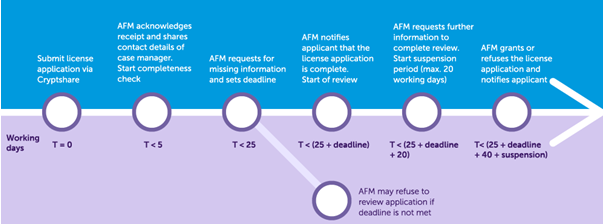CASP-license
Crypto-Asset Service Providers (CASPs) are defined under MiCAR as a legal person or other undertaking whose occupation or business is the provision of one or more crypto-asset services to clients on a professional basis, and that is allowed to provide crypto-asset services in accordance with Article 59 MiCAR.
For the fit and proper testing, persons in charge of day-to-day operations and members of the supervisory board of CASP’s will be assessed taking into account the requirements of the Joint EBA and ESMA Guidelines on the suitability assessment of shareholders and members with qualifying holdings in issuers of ARTs and in CASPs.
Definition
MiCAR defines ‘crypto-assets’ as “a digital representation of a value or of a right that is able to be transferred and stored electronically using distributed ledger technology or similar technology”. A ‘crypto-asset service’ means any of the following services and activities relating to any crypto-asset:
(a) providing custody and administration of crypto-assets on behalf of clients;
(b) operation of a trading platform for crypto-assets;
(c) exchange of crypto-assets for funds;
(d) exchange of crypto-assets for other crypto-assets;
(e) execution of orders for crypto-assets on behalf of clients;
(f) placing of crypto-assets;
(g) reception and transmission of orders for crypto-assets on behalf of clients;
(h) providing advice on crypto-assets;
(i) providing portfolio management on crypto-assets;
(j) providing transfer services for crypto-assets on behalf of clients.
Thus, any person wishing to provide any of these services in the EU must be authorized under MiCAR, via either a CASP-license (see Article 63 MiCAR) or a CASP-notification (see Article 60 MiCAR).
Minimum duration of a CASP licence application
A CASP licence application will take several months. Based on our experience, even in a best-case scenario it will take at least five months. A best-case scenario generally means that the application is complete and of high quality, but also that products and services are not very complex or high-risk and no significant organisational changes are required. In practice, it will often take longer, for example because the applicant has to make certain changes.
CASP licensing preparation
Best practices for submitting a licence application.
Applicant:
• Determines which MiCAR rules apply to its organisation (scoping).
• Acquires knowledge related to the MiCAR rules.
• Obtains advice in preparation for the MiCAR application (if necessary).
• Contacts the AFM in good time at crypto@afm.nl.
• Submits a comprehensive licence application with a clear list of the included documents.
• Is prepared to answer questions from the AFM (and DNB) promptly.
• Applies for a pre-scan procedure before submission (optional).
The AFM and the applicant will communicate with each other on an ad hoc basis during the procedure and supervisory interviews will be arranged if necessary.
CASP licensing procedure
Roadmap
Statutory completeness period
• Submits licence application by e-mail (via Cryptshare)• The AFM acknowledges receipt of the licence application within 5 working days.
• The AFM performs the first completeness check of the application. The statutory period for submitting a complete application starts (25 working days).
• The AFM asks the applicant for missing information and sets a deadline to supply it (5-20 working days). The AFM may refuse to consider applications that remain incomplete after this request.
Statutory assessment period
• The AFM notifies the applicant that the application is complete. The statutory assessment period starts (40 working days).• Within a maximum of 20 working days, the AFM requests any further information necessary to complete the assessment.
• The AFM takes a decision (granting or refusing the licence) and notifies the applicant within 5 working days.
The total statutory period is a maximum of around 5 months (105 working days). However, this period will often be longer due to certain circumstances (e.g. changes that an applicant has to make).

Visualization of the CASP-licensing procedure
The CASP-license application can be submitted securely by use of Cryptshare. Please ensure that you follow the instructions in the CASP-license application form, such as the right naming conventions and clear referencing to supporting documentation.
The CASP-licensing procedure is an iterative process, in which the AFM and you will communicate on an ad-hoc basis about the process or small questions. Additionally, we expect there will be approximately 1-3 supervisory meetings dependent on the nature, scale and complexity of the application.